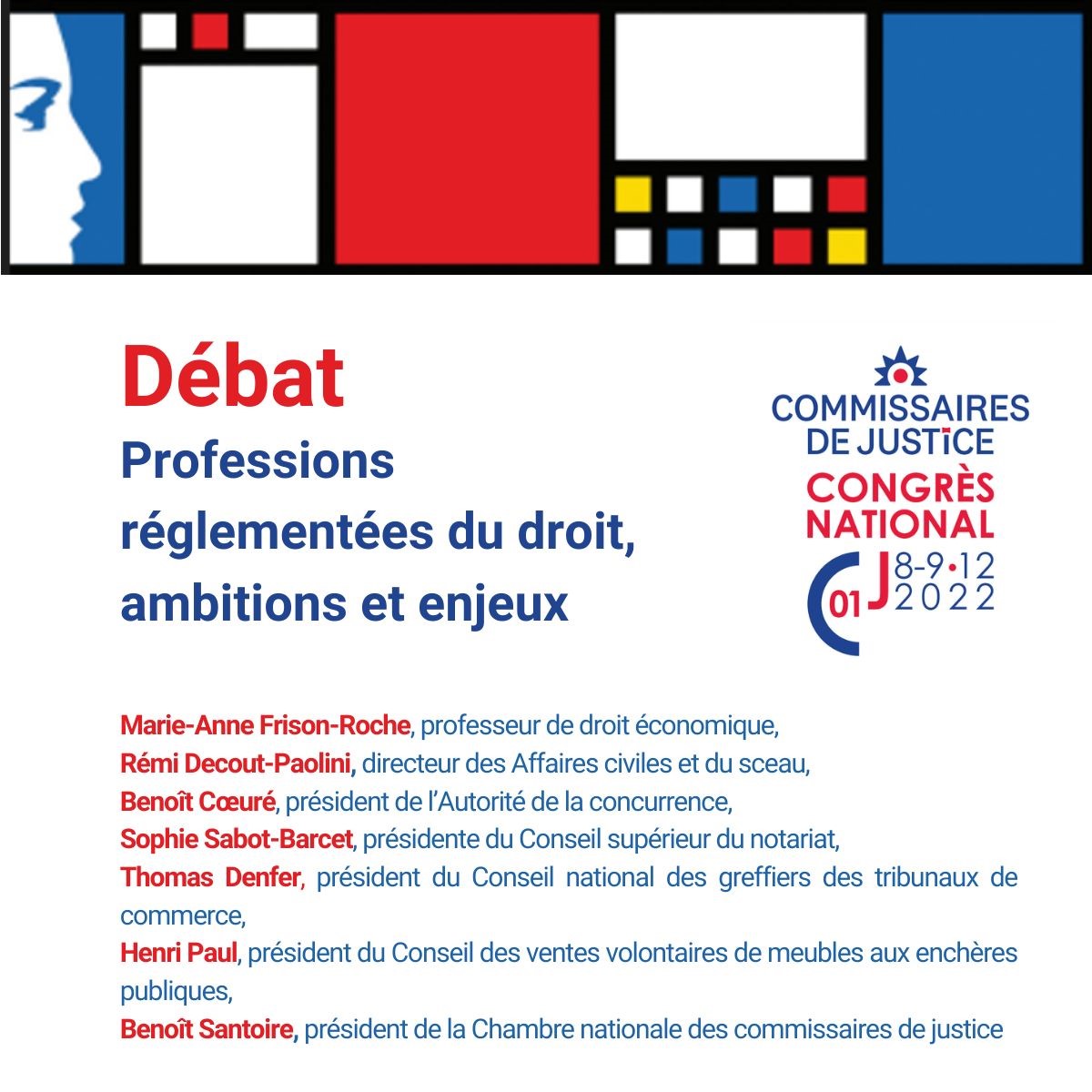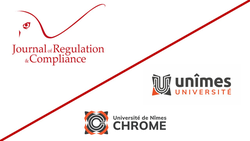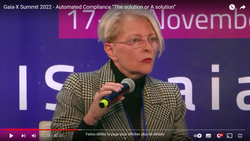The recent news

Updated: Dec. 28, 2022 (Initial publication: July 10, 2022)
Publications

♾️ follow Marie-Anne Frison-Roche on LinkedIn
♾️ subscribe to the Newsletter MAFR Regulation, Compliance, Law
____
 ► Full reference: M.A. Frison-Roche, Regulatory and Compliance Law, expression of the missions of a professional Order, Working Paper, July 2022.
► Full reference: M.A. Frison-Roche, Regulatory and Compliance Law, expression of the missions of a professional Order, Working Paper, July 2022.
____
🎤 This Working Paper has been done as basis for an intervention in the Annual Congress of the French Professional Order of the Géomètres-Experts, September 15, 2022 (conference given in French)
____
🎥watch the short presentation of this speech (in French)
____
🎥watch the full speech given on 15 September 2022, based on this working paper
____
► Summary of the Working Paper: Professional orders should not present themselves as exceptions, however legitimate they may be, in relation to a principle, which would be the competitive system, but as the expression of a principle. This principle is expressed by two branches of Law whose importance is constantly growing in European Law, liberal branches which are based on the conception of economic life and the definition of company, turned towards the future: the Regulatory Law and Compliance Law, two branches of Law at the same time related and distinct.
Indeed, and this is the topic of the first part, Competition Law conceives professional orders as exceptions since these "corporations" constitute structural agreements. French domestic legal system both consolidates the professional orders by backing them up to the State, which would sub-delegate its powers to them, but involves them in the questioning by the European Union of the States and their tools. Most often the temptation is then to recall with a kind of nostalgia the times when the professional orders were the principle but, except to ask for a restoration, the time would be no more.
A more dynamic approach is possible, in accordance with the more general evolution of Economic Law. Indeed, the Professional Order is the expression of a profession, a little-exploited concept in Economic Law, over which the Order exercises the function of "Second-level Regulator", the public authorities exercising the function of "First-level Regulator". The Banking and Financial Regulatory Law is built in this way and operates thank to that, at national, European, and global level. This is what should be linked.
The Professional Orders therefore have the primary function of spreading a "Culture of Compliance" among the professionals they supervise and beyond them (clients and stakeholders). This culture of Compliance is developed regarding the missions which are concretized by the professionals themselves.
Therefore, the second part of the Working Paper deals with the legal evolution of the notion of "Mission" which has become central in Economic and General Law, through the technique of the mission-based company. However, there are multiple points of contact between the raison d'être, the company with a mission and Compliance Law as soon as the latter is defined by the concrete and overly ambitious goals that it pursues. : the Monumental Goals.
Each structure, for example the French Ordre des Géomètres-Experts, is legitimate to set the Monumental Goal that it pursues and that it inculcates, in particular the conception of territory and the living environment, joining what unites all the Monumental Goals of Compliance: concern for others. The French Ordre des Géomètres-Experts, is adequate because it has a more flexible relationship, both tighter and broader, with the territory than the State itself.
By instilling this in professionals, the Professional Order develops in the practitioner an "ex ante responsibility", which is a pillar of Compliance Law, constituting both a charge and a power that the practitioner exercises, and of which the Professional Order must be the supervisor.
____
🔓read the Working Paper⤵️
Dec. 8, 2022
Conferences

♾️ suivre Marie-Anne Frison-Roche sur LinkedIn
♾️s'abonner à la Newsletter MAFR Regulation, Compliance, Law
____
► Référence complète : M.-A. Frison-Roche, "La compliance, perspective dynamique pour exprimer la raison d'être des commissaires de justice", in Table-ronde sur "Professions réglementées, ambitions et enjeux", Congrès annuel national des Commissaires de justice, Paris, 8 décembre 2022.
____
►lire le programme complet du congrès et 🎥regarder la présentation du colloque par le président du Congrès
____
____
►présentation de l'intervention : Ce premier congrès annuel national des Commissaires de justice, réunissant pour la première fois la profession réformée, a débuté par un débat de 2 heures animé par une journaliste, débat entre les autres professions, les autorités publiques (Autorité de la concurrence, Chancellerie), ayant pour ma part à y apporter le regard académique :

Ce débat fut particulièrement animé et vivant, ne serait-ce qu'en raison de la configuration des lieux, chacun étant placé pour entrer dans un dialogue :

🎤 J'y pris la parole en premier pour insister sur le fait que les "professions" sont des structures qui ont un grand avenir, en ce qu'elles s'articulent avec le système économique libéral, qu'elles sont par nature régulées et porteuses de régulation, dans des systèmes qui, pour demeurer libéraux, vont en avoir de plus en plus besoin. Cela est pertinent pour la profession des Commissaires de justice qui procurent de la sécurité, via de l'incontestabilité reposant aussi sur le lien entre celle-ci et les faits, et qui assurent l'effectivité des engagements en gardant le souci du lien social.
🎤 J'ai repris la parole lorsque la place de la Compliance fut évoquée. Dépassant l'exigence de "conformité", qui n'est qu'un outil de la Compliance, j'ai montré l'avenir du Droit de la Compliance, notamment dans l'Europe qui associe dynamisme économique, souci des personnes et de l'environnement, et l'alliance que cela implique entre les Autorités politiques et publiques et les entités susceptibles de participer à la concrétisation de ces Buts Monumentaux de la Compliance.
📕 Pour aller plus loin : M.-A. Frison-Roche (dir.), Les buts monumentaux de la compliance, 2022.
________

regarder la présentation du colloque par le président du Congrès

Dec. 5, 2022
Teachings : Participation à des jurys de thèses

♾️ suivre Marie-Anne Frison-Roche sur LinkedIn
♾️s'abonner à la Newsletter MAFR Regulation, Compliance, Law
____
► Référence complète : M.-A. Frison-Roche, membre du jury de la thèse d'Antoine Oumedjkane, Compliance et droit administratif, Université de Montpellier, Salle des Actes, Université de Montpellier, 5 décembre 2022, 14h-
____
🪑🪑🪑Autres membres du jury :
🕴🏻Pascale Idoux, directrice de la thèse
🕴🏻Lucie Cluzel-Métayer, rapporteure
🕴🏻Aude Rouyère, rapporteure
🕴🏻Thomas Perroud, professeur à l'Université Panthéon-Assas (Paris II)
____
► La thèse a été ultérieurement publié : cliquer ICI
____
Dec. 1, 2022
Publications

🌐 follow Marie-Anne Frison-Roche sur LinkedIn
🌐subscribe to the Newsletter MAFR Regulation, Compliance, Law
____
► Full Reference: M.-A. Frison-Roche, "Contrat de compliance, clauses de compliance", Chronique of Compliance Law, D.2022, p.2115-2117.
____
📝reac the article (this article is written in French)
____
► English summary of the article: Compliance Law is often seen only as an obligation to comply with regulations. Contract Law is masked by the study of texts and sanctions. Civil liability cases are beginning to highlight the commitments of companies, acts of will. It remains to discern the importance of contracts.
First, there is a specific contract: the "compliance contract". Its purpose is to provide a third party with a service, the means for the company to "comply" with the legal systems requirements ("contract of conformity"), and/or to enable the company to achieve the monumental goals that characterize Compliance Law (contract of compliance). The interpretation and the regime of these compliance contracts must be marked by the Compliance Law that permeates it. Secondly, there are a multitude of stipulations aimed at conformity and Compliance.
____
🚧read the working paper written in English: Compliance contract, Compliance stipulations
____
📚read the other articles published in this chronique of Compliance Law published in the Recueil Dalloz.
________
Nov. 29, 2022
Conferences

♾️ suivre Marie-Anne Frison-Roche sur LinkedIn
♾️s'abonner à la Newsletter MAFR Regulation, Compliance, Law
____
Référence générale : M.-A. Frison-Roche, "La compliance au coeur de la santé durable", in Pour une géopolitique de la santé durable, Université de Laval, 29 novembre 2022.
___
consulter le programme général du colloque
Nov. 18, 2022
Conferences

♾️ suivre Marie-Anne Frison-Roche sur LinkedIn

♾️s'abonner à la Newsletter MAFR Regulation, Compliance, Law
____
► Référence complète : M.-A. Frison-Roche, "Synthèse", in Journal of Regulation & Compliance (JoRC) et Université de Nîmes Compliance et Contrat : les acteurs et leurs stratégies, Nîmes, 18 novembre 2022.
____
🧮 lire le programme complet du colloque
____
🏗️Ce colloque prend place dans le cycle de colloques, organisé par le Journal of Regulation & Compliance (JoRC) et les Universités qui sont ses partenaires académiques, pendant l'année 2022/2023 autour du thème général L'obligation de compliance.
____
✏️ cette synthèse prend appui sur un document de travail élaboré en temps réel au fur et à mesure que se déroulait la journée du colloque.
🚧 lire ce document de travail : "Ce qui est commun à la Compliance, au Contrat et aux Personnes impliquées par le Contrat"
____
► Résumé de la synthèse réalisée en temps réel :
Nov. 18, 2022
Conferences

♾️ suivre Marie-Anne Frison-Roche sur LinkedIn
♾️s'abonner à la Newsletter MAFR Regulation, Compliance, Law
____
► Référence complète : M.-A. Frison-Roche, "Le juge, tiers régulateur des obligations contractuelles de compliance", in Journal of Regulation & Compliance (JoRC) et Université de Nîmes, Laboratoire CHROME, Compliance et Contrat : les acteurs et leurs stratégies, Nîmes, 18 novembre 2022.
____
🏗️Cette conférence prend place dans le cycle de colloques, organisé par le Journal of Regulation & Compliance (JoRC) et les Universités qui sont ses partenaires académiques, pendant l'année 2022/2023 autour du thème général L'obligation de compliance.
____
🎤 consulter la synthèse également faite de ce colloque
____
🧮Consulter le programme complet de cette manifestation
____
🚧lire le document de travail servant de base à cette conférence
____
📝Cette conférence sera la base d'un article, à paraître dans un ouvrage qui en résultera, dans sa version française, dans la collection 📚Régulation & Compliance coéditée entre le JoRC et les Editions Dalloz, et dans sa version anglaise, dans la collection 📚Compliance & Regulation coéditée entre le JoRC et les Editions Bruylant.
____
Nov. 17, 2022
Conferences

♾️ follow Marie-Anne Frison-Roche on LinkedIn
♾️subscribe to the Newsletter MAFR Regulation, Compliance, Law
____
► Full Reference: M.-A. Frison-Roche, "The distinction between the part and the whole", contribution of the Chapter 2 of the third global Summit of Gaia-X, Chapter on Automated compliance: "the" solution or "a" solution?, November 17, 2022, Paris.
____
This intervention took place in a panel moderated by🕴️Hubert Tardieu, Board of Direction Gaia-X, with:
🕴️Martine Gouriet, Board of Direction Gaia-X and Directrice des Usages numériques EDF – DSIG
🕴️Jakob Rehof, Chair, Software Engineering, Technical University Dortmund Faculty of Computer Science and Director Research Strategy, Fraunhofer-ISST
🕴️Joëlle Toledano, Conseil National du Numérique (CNNum), Chaire Gouvernance & Régulation (Université Dauphine) – Emeritus Professor
____
🧮see the Summit general programme programme
____
🚧read the working paper, basis of this intervention.
____
🎥 see this intervention and debate
____
📝read the presentation of the intervention done in the GaiaX Global Summit of 2020
________